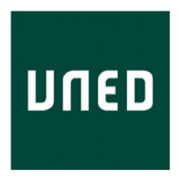 The National Distance Education University (UNED) is a Spanish public university that provides distance education at national and international levels. It was founded in 1972 to enable priority access to university and further education for all those who, while capable of pursuing higher studies, were unable to attend on campus classes for work, financial, residential, or other reasons. With more than 260,000 students, it is the largest higher education institution in Spain and one of the largest universities in Europe. It is also the leader in the implementation of cutting edge technologies applied to teaching and learning, with the largest offer of online courses in Spain. The difference between UNED and the rest of universities in Spain lies not only in its student numbers but also on its geographic dimension (national and international) and on the use of a blended-learning methodology and complementary pedagogical tools (television, radio, video and online virtual university campus).
The National Distance Education University (UNED) is a Spanish public university that provides distance education at national and international levels. It was founded in 1972 to enable priority access to university and further education for all those who, while capable of pursuing higher studies, were unable to attend on campus classes for work, financial, residential, or other reasons. With more than 260,000 students, it is the largest higher education institution in Spain and one of the largest universities in Europe. It is also the leader in the implementation of cutting edge technologies applied to teaching and learning, with the largest offer of online courses in Spain. The difference between UNED and the rest of universities in Spain lies not only in its student numbers but also on its geographic dimension (national and international) and on the use of a blended-learning methodology and complementary pedagogical tools (television, radio, video and online virtual university campus).
UNED has more than sixty associated regional study centres with more than 100 extensions and classrooms, where tutoring takes place and also the venues for the proctoring of in-person exams, allowing students to access all kinds of academic services, including libraries, audiovisual materials, face-to-face tutorials, videoconferencing and a virtual campus (telematic tutoring). Furthermore, UNED is present in thirteen countries in Europe (Germany, Belgium, France, United Kingdom, Switzerland, and Italy), America (United States, Argentina, Peru, Mexico, Brazil and Venezuela) and Africa (Equatorial Guinea). UNED has more than 1,400 academic teaching staff, distributed in nine Faculties and two Technical Schools. Moreover, the associated regional study centres have more than 7,000 tutors.
We coordinate this project and have particular interest in the way in which MOOCs can be used by displaced people to potentiate their development of language and communication skills.
Team Members
- Timothy Read, Coordinator. Associate Vicechancellor of Technological Innovation and Methodology and funding Co-director of the ATLAS research group
- Elena Barcena, Co-coordinator. Funding Coordinator of the Master in ICT for Language Teaching and Procesing and funding Director of ATLAS
- Jorge Arús, Member. Vicedean of Technology at the Faculty of Philology, Universidad Complutense de Madrid and member of ATLAS
- María Dolores Castrillo, Member. Academic Secretary of the Dpt. of Modern Languages and member of ATLAS
- Ana Ibáñez, Member. ERASMUS Coordinator and member of ATLAS
- Antonio Pareja-Lora, Member. Associate Professor (Tenure Track) at Universidad Complutense de Madrid and member of ATLAS
- Elena Martín-Monje, Member. Co-coordinator of the Degree in English Studies and member of ATLAS
- Beatriz Sedano, Co-coordinator. Administrative Assistant and Researcher
- Victoria Khraiche Ruiz-Zorrilla, Adjunt professor Universidad de Valladolid and Secretary of Asilim. Collaborator of ATLAS

